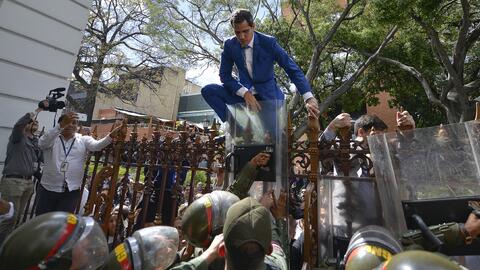New report “imagines” negotiated solution in Venezuela

A new report by the International Crisis Group (ICG) is calling for renewed efforts by the international community to push for a negotiated settlement to the political power struggle in Venezuela to pave the way for free and fair parliamentary elections later this year as well as the gradual lifting of U.S. sanctions.
The 30-page report, titled ‘Imagining a Resolution of Venezuela’s Crisis’, urges that despite the breakdown of previous negotiations “a route to a compromise solution remains possible” as long as both sides are willing to make concessions as well as the Trump administration.
Pragmatists on both sides, moderate ‘chavistas’ (supporters of former President Hugo Chavez) and members of the opposition privately recognize some essential elements of a possible compromise solution, with other aspects remain highly controversial, according to the Crisis Group, an independent Brussels-based group that seeks to resolve conflict and monitors Venezuela closely.
It warns that the cost of a continued stalemate far outweighs the price of the necessary concessions.
“Neither side can achieve all that it desires, and at this point the price paid by Venezuela and its people – regardless of whether they are chavistas or opposition sympathizers – for maintaining the status quo far exceeds the price either would pay as a result of pragmatic, principled compromise,” the report states.
“If no progress is made toward resolution, Venezuela runs the risk of ending this year with parliamentary elections boycotted by the bulk of the opposition, all institutions in government hands, a heightened political crisis, tougher sanctions and greater economic misery for the vast majority of the population,” it adds.
The report arises from a series of discussions held by the Crisis Group last year with moderates on both sides, according to one of the author, Phil Gunson, Crisis Group’s Caracas-based senior analyst for the Andes region.
Peace plan
“It’s road tested in that sense,” he told Univision Noticias. “This is what we feel is a potential road map for the Venezuela crisis - for the leaders of both sides. It’s sort of a peace plan,” he added.
Gunson said that by using the word ‘imagining’ in the title, the Crisis Group recognized that the conditions for a negotiated solution are currently far from ideal. “We have taken several steps back this year. This doesn’t mean that negotiating a solution is the wrong way to go. It requires that the allies of both sides tell them that ‘you need to sit down and negotiate this,’” he said.
US and Russia
The U.S. elections and the geopolitical ambitions of Russian leader Vladimir Putin also are not helpful. Florida’s Cubans and Venezuelan exile communities exercise an outsize influence on U.S. politics in a key swing state in November, while Putin is anxious to restore Russia as a global power by maintaining its oil interests in Venezuela as a foothold in the western hemisphere.
But the report mostly focuses on the domestic issues in Venezuela that have kept both sides so bitterly divided.
“On one side is the unwillingness of senior government figures to submit to an early, competitive presidential election when they claim to see no fault in the 2018 poll and pin all blame on a U.S.-led campaign of regime change. On the other are the opposition’s doubts as to whether they could ever trust a government they regard as venal, autocratic and so bent on staying in power that it has manipulated the electoral system to its advantage,” the report states.
The possible path to a solution rests on several pillars, it says. Among those are restoration of trust through reciprocal gestures; creation of conditions for fairer elections and a readiness by the opposition and the U.S. to scale back sanctions.
Silent majority
Among the obstacles that need to be overcome is a resistance on both sides to allow moderate voices to be heard, said Gunson. Since the emergence last year of National Assembly president Juan Guaido, the opposition have closed ranks around him as the country’s legitimate interim president, backed by 60 countries around the globe. Similarly, the sanctions pressure heaped on the government of Nicolas Maduro makes it difficult for alternative voices to heard in chavismo, he argued.
“Moderates find it hard to speak out because they are accused of being traitors and collaborators,” he told Univision.
But the Crisis Group believes a silent majority would like to see a negotiated solution, fearing that the alternative will mean more political violence, humanitarian suffering and migration.
On top of that, the coronavirus outbreak and a possible global recession could also see unprecedented hardship in Venezuela, a country where the government is 90 percent dependent on petroleum exports for foreign currency revenue. Falling global demand for energy in a recession could reduce Venezuela’s export revenue to as little as $10 billion this year, according to some estimates, one tenth of revenue when Maduro came to power, said Gunson.
In such circumstances that would make international sanctions even less acceptable, said Gunson.
“This is an unprecedented collapse in peacetime. We are in unchartered territory. There’s a real fear on the part of the humanitarian organizations that this becomes a forgotten crisis.”
